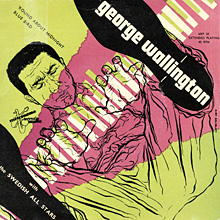Wallington was retired from music for a quarter century, finally returning in 1984 to record three albums before he died in 1993.
In 1952, Wallington was 28 years old and a veteran of the jazz world. He had been a part of the first band that Dizzy Gillespie brought to 52nd Street, in 1944. And even then, at 19, he was a seasoned veteran. He had grown up in an Italian immigrant family (his birth name was Giacinto Figlia - "Wallington" was a schoolyard nickname because he dressed like a British swell). His father had introduced him to opera, and gotten him started on piano and solfeggia (sight singing); Lester Young (heard on the radio with Count Basie's band) inspired him to turn to jazz. By 16 he was playing in clubs in New York, including a spot called George's, where he accompanied Billie Holiday.
About that first bebop gig with Dizzy, at the Onyx Club, Wallington said:
Dizzy used to take me to his house and we'd play and he showed me his songs. Then he and Oscar Pettiford started the band at the Onyx. Charlie Parker was supposed to join us but he couldn't get a cabaret card. Anyway we had Don Byas, then Lester Young. Billie Holiday used to sing with us sometimes and Sarah Vaughan used to come in too.OK, this is why, when anyone asks me "If you could go back in time to another era, what would it be?" my answer is always the same. New York, 1940s. 52nd Street, Minton's, Monroe's.
I don't know if we thought of what we were doing at the Onyx as something historic, but we did know we were doing something new and that no one else could play it.
Max Roach said of Wallington'a role in that first band at the Onyx that his great virtue was knowing how to stay out of the way.
We didn't need a piano player [like Bud Powell] to show us the way to go. Piano players up to that point played leading chords. We didn't do that because we were always evolving our own solo directions. We needed a piano player to stay outta the way. The one that stayed outta the way best was the best for us. That's why George Wallington fitted in so well with us, because he stayed outta the way, and when he played a solo, he'd fill it up; sounded just like Bud.Leading his own group, Wallington didn't need to stay outta the way, and Roach was still propelling him on, and the sidemen on these two sessions give some idea of how much respect Wallington had garnered by this time -- even from Oscar Pettiford, whom Roach remembers as not being entirely won over by Wallington when the Onyx Club gig came together:
Every now and then, George would miss a chord, and Oscar would jump all over him, "White muthafucka can't play -- shit!" I had to spend a lot of time protecting him from Oscar."Sounded just like Bud" is something you hear a lot in discussions of George Wallington. They were two of the most important pianists in the development of bebop -- and, Wallington's ability to stay outta the way notwithstanding, two of the most accomplished and daring virtuosi. But there's a lot of difference, too. Wallington's early classical training shines through, and you can hear the sorts of romantic flourishes you'd associate with a Vladimir Horowitz. But when Wallington takes on an unabashedly romantic tune like "Laura" or "Tenderly," those same flourishes become dry, ironic, brilliantly anti-romantic.
Speaking of romanticism and "Tenderly," here's a story told to me by the great pop singer Margaret Whiting, who was a close friend when I lived in New York in the 70s. She and songwriter Walter Gross had been an item, but she'd had to break it off because of his drinking. But then one night he showed up at her house about two int he morning, drunkenly banging on her door and demanding to be let in. She had no choice - she opened the door before he could wake the whole neighborhood.
He confronted her: "You fucking bitch...you ruined my life, you fucking cunt. So I came by to tell you just what I thought of you, you fucking bitch." He staggered over to the piano. "I wrote this to show you what I think of you, you fucking bitch." And he played "Tenderly."
Margaret was a romantic, but also a realist. She got some coffee into him, and immediately called...who but a lyricist? Jack Lawrence came over, and they finished the song.
On the first of these sessions, Chuck Wayne joins the group on mandola, which is an unusual instrument -- slightly larger than a mandolin, it bears the same relation to a mandolin that the viola has to the violin. It's also an unusual instrument for a bebop ensemble in that it uses the same tuning as the tenor banjo, an instrument associated with the early Dixieland bands.
But Wayne was an unusual jazz guitarist -- for one thing, he may well have been the only jazz guitarist ever to play the banjo on bebop recordings.. Like Wallington, he was the son of immigrant parents (Czech, in his case -- he was born Charles Jagelka), and his musical start was playing the mandolin in a balalaika band.
He had switched to jazz, and to the guitar, by the time he met George Wallington. They were both playing in a Dixieland group led by Joe Marsala, and Wallington introduced him to bebop. They're a good pairing on these quartet sessions.
And tossing this in -- Wallington composed "Godchild," one of the tunes on Birth of the Cool.
The trio and quartet sessions were all released on 78, and all on the same 10-inch LP (as George Wallington Trio).



No comments:
Post a Comment